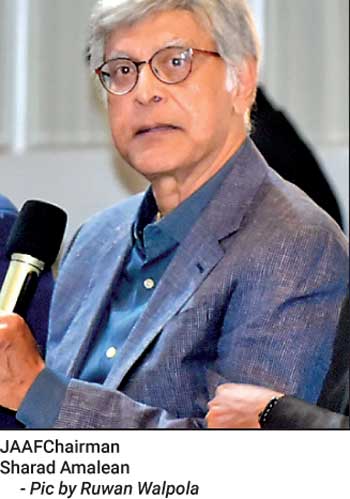Wednesday Feb 18, 2026
Wednesday Feb 18, 2026
Monday, 3 April 2023 00:39 - - {{hitsCtrl.values.hits}}
 As a member of a high-powered stakeholder panel at the Chartered Accountants Forum on 'Economic Dialogue': IMF and Beyond, last week the Joint Apparel Association Forum (JAAF) Chairman Sharad Amalean emphasised the importance of implementing policy reforms that promote market competitiveness to sustain Sri Lanka's export-led economy.
As a member of a high-powered stakeholder panel at the Chartered Accountants Forum on 'Economic Dialogue': IMF and Beyond, last week the Joint Apparel Association Forum (JAAF) Chairman Sharad Amalean emphasised the importance of implementing policy reforms that promote market competitiveness to sustain Sri Lanka's export-led economy.
Amalean noted that despite the economic crisis and pandemic, the apparel industry maintained the confidence of global buyers due to the country's ability to continue operations during challenging times. He added that the Government's support in designating the industry as an “essential service” during the pandemic was a crucial factor to creating that enabling environment that instilled confidence.
With the apparel sector currently experiencing a 20-25% drop in orders, Amalean stressed it is critical to create an environment that facilitates ease of doing exports, particularly given the recent changes in the retail sector that have mostly impacted Small and Medium Enterprises (SMEs). He emphasised the need to seize the opportunities presented by Sri Lanka's neighbours and create an environment for ease of doing business. He highlighted that the gazette which supported the competitiveness of the export industry was recently repealed, impacting the export sector negatively.
“There is a disruption in the retail trade and we must remain relevant,” stressed Amalean. “We have to observe the possibilities around us. There is a dire need to liberalise shipping and logistics and also create an environment for ease of doing business. Now that we have signed the agreement with the IMF, let's ensure we look through the window of opportunity to continue elevating our status in the global apparel arena.”
In his keynote address, President Ranil Wickremesinghe stated that liberalising trade is essential to unlock Sri Lanka's growth potential and to create a competitive economy. He highlighted the need to modernise existing regulations that will eliminate impediments to private investment, laying the groundwork for a highly competitive social economy in the next two years. He also expressed the desire to upgrade the Free Trade Agreement with India for economic and technical cooperation and join the regional comprehensive economic partnership.
The Chartered Accountants Forum on ‘Economic Dialogue’: IMF and Beyond had participation of political representatives from the Government and Opposition, business leaders and C-suite executives from various industries who deliberated on the implementation and impact of the IMF program, tax system improvements, reduce wasteful spending and combat corruption.
